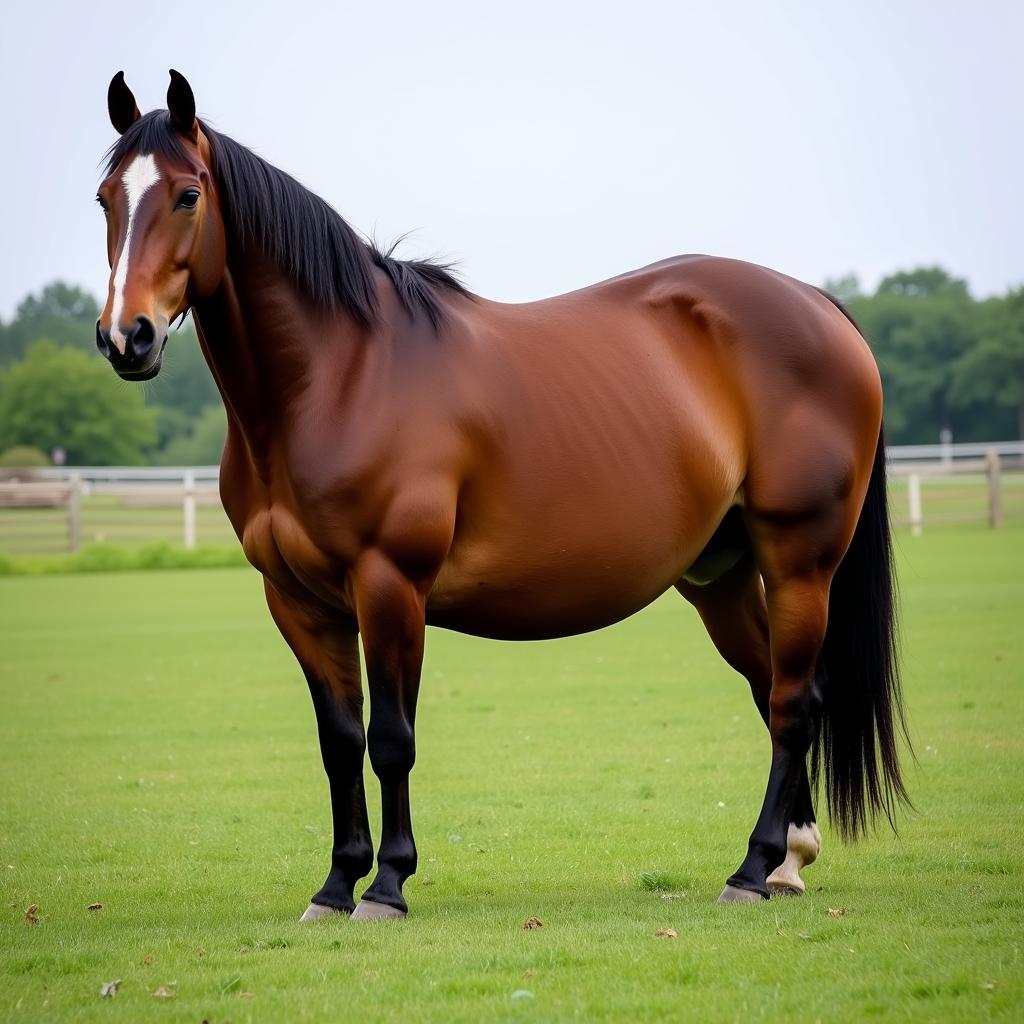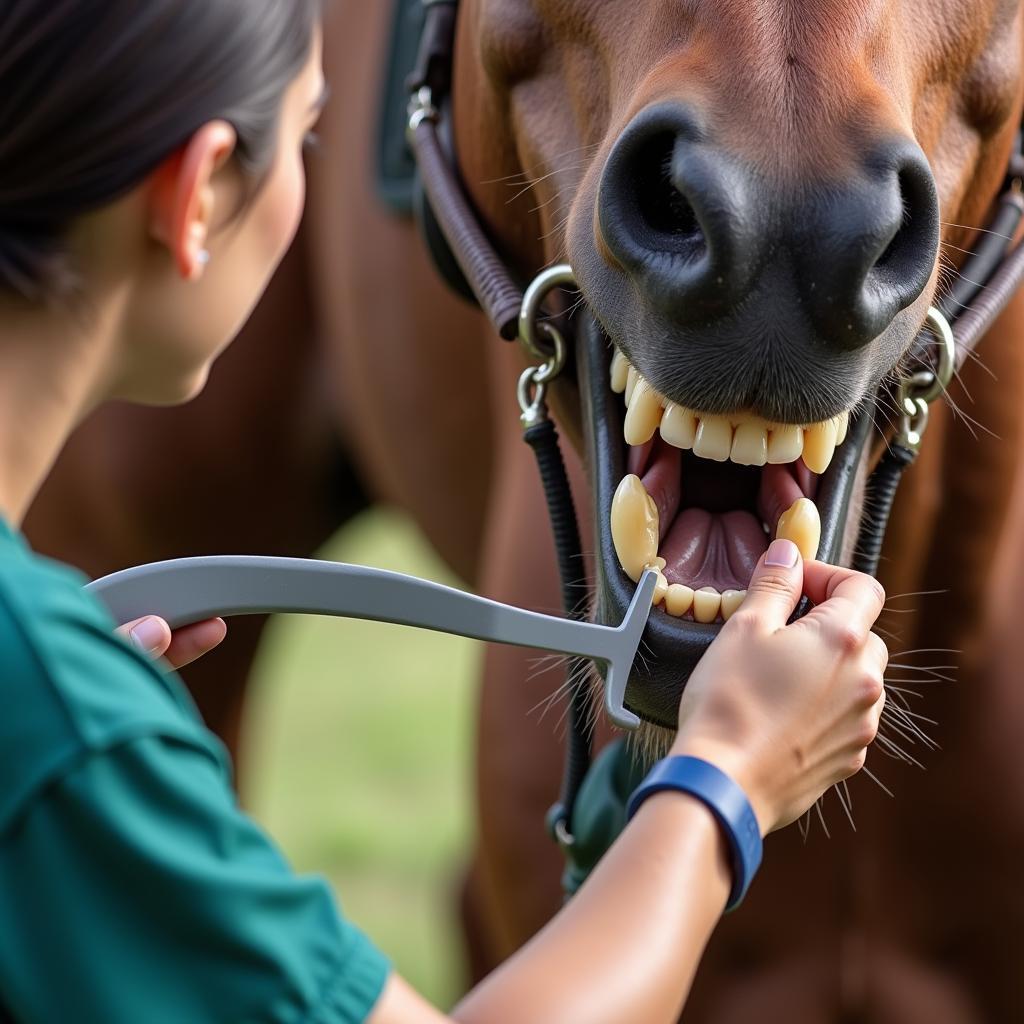Understanding how to manage your horse’s weight is a crucial part of responsible equine care. Just like humans, horses can experience weight fluctuations due to various factors, and achieving a healthy weight is essential for their overall well-being and performance.
 Overweight Horse Grazing
Overweight Horse Grazing
Identifying Weight Issues in Horses
Determining if your horse is overweight can be tricky as different breeds have different ideal body conditions. However, there are some common signs to look out for:
- Rib Coverage: You should be able to feel your horse’s ribs easily, but they shouldn’t be visible.
- Fat Deposits: Check for fat deposits along the neck, behind the shoulders, around the tailhead, and in the sheath or udder area.
- Cresty Neck: A thick, firm crest that falls to one side is a clear sign of excess weight.
- Girth Groove: Overweight horses often develop a noticeable groove where the girth sits.
Causes of Weight Gain in Horses
There are several reasons why a horse might gain weight:
- Overfeeding: Feeding more than your horse needs, especially high-calorie concentrates, is a common culprit.
- Lack of Exercise: Horses that don’t get enough exercise are more prone to weight gain.
- Metabolic Disorders: Certain conditions, such as Cushing’s disease, can predispose horses to obesity.
- Genetics: Some breeds are naturally more prone to weight gain than others.
Safe and Effective Weight Loss for Horses
If you suspect your horse is overweight, it’s essential to consult your veterinarian to rule out any underlying medical conditions and develop a safe weight loss plan. Here are some general guidelines:
1. Dietary Adjustments
- Reduce Calorie Intake: Gradually decrease your horse’s calorie intake by feeding less concentrate and/or choosing lower-calorie feed options.
- Increase Forage: Provide plenty of low-calorie forage, such as hay, which can help your horse feel full and satisfied.
- Limit Treats: Treats should be given sparingly and only as rewards for good behavior.
2. Exercise Regimen
- Gradual Increase: Start with short periods of exercise and gradually increase the duration and intensity.
- Variety is Key: Incorporate different types of exercise, such as riding, lunging, and turnout with other horses.
 Veterinarian Checking Horse's Teeth
Veterinarian Checking Horse's Teeth
3. Monitoring Progress
- Regular Weigh-Ins: Weigh your horse regularly to track their progress.
- Body Condition Scoring: Learn how to body condition score your horse to assess their fat cover objectively.
- Adjust as Needed: Be prepared to adjust your horse’s diet and exercise plan as needed based on their progress.
Importance of a Gradual Approach
It’s crucial to approach Weight Loss In Horses gradually. Rapid weight loss can be dangerous and lead to health problems such as:
- Liver Disease: Mobilizing fat too quickly can overwhelm the liver.
- Muscle Loss: Crash dieting can cause horses to lose muscle mass along with fat.
Expert Insights
“Weight management is a marathon, not a sprint,” says Dr. Sarah Williams, a leading equine veterinarian. “It’s crucial to work closely with your vet to develop a safe and effective plan tailored to your horse’s individual needs. Remember, patience and consistency are key.”
Weight Loss and Older Horses
Older horses often require special consideration when it comes to weight loss. They may have age-related health conditions or dental problems that affect their ability to chew and digest food properly. Chopped hay for horses with bad teeth can be a good option to ensure they are getting adequate nutrition. It’s crucial to consult your veterinarian to create a tailored weight management plan for your senior horse.
Conclusion
Managing your horse’s weight effectively is vital for their long-term health and well-being. By understanding the causes of weight gain and following a safe and gradual approach to weight loss, you can help your equine companion achieve and maintain a healthy weight for years to come. Remember, always consult with your veterinarian for guidance and to address any concerns you may have.
Frequently Asked Questions
1. How much weight should my horse lose per week?
A safe rate of weight loss for horses is 1-2% of their body weight per week.
2. Can I put my horse on a diet without consulting a veterinarian?
It’s always best to consult with your veterinarian before making any significant changes to your horse’s diet.
3. What are some low-calorie treat options for my horse?
Carrots, apples (without seeds), and sugar-free horse treats are all good low-calorie options.
4. What type of exercise is best for weight loss in horses?
A combination of riding, lunging, and turnout with other horses is ideal.
5. How long will it take for my horse to lose weight?
The time it takes for a horse to lose weight varies depending on several factors, including their starting weight, diet, and exercise program.
Need help managing your horse’s weight? Contact us at Phone Number: 0772127271, Email: [email protected] Or visit us at QGM2+WX2, Vị Trung, Vị Thuỷ, Hậu Giang, Việt Nam. Our dedicated customer support team is available 24/7.